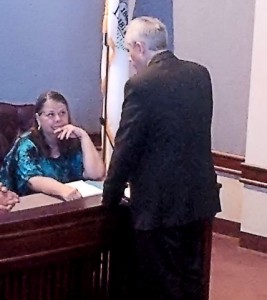It started with a pill. It ended with the death of two daughters and a mother clinging ferociously to her only remaining child.
Dollie Cooper’s daughter Trisha, the youngest of three girls, was caught selling a pill when she was a freshman in high school. The probation officer asked Dollie, a registered nurse, to get the daughter off drugs.

Dollie, who lost two daughters to heroin addiction, and nearly lost a third, speaks with Madison County State’s Attorney Tom Gibbons prior to a Madison County Heroin Task Force meeting Friday, June 13 / Photo by Roger Starkey
“I’m an intelligent woman, but I absolutely didn’t know what I was up against,” Dollie told a group gathered Friday in the Madison County Board Room to hear the latest presentation from the recently formed Madison County Heroin Task Force.
What followed for Trisha was a series of trips into and out of rehab centers. Trisha did not want to quit heroin.
“You can lead a horse to water, but they have to want to drink,” Dollie said.
Trisha had a baby girl, but she continued to use heroin. She stole from her mother. Dollie finally pressed charges against her daughter when she discovered Trisha was writing checks in her name. The checks had been cashed in 17 counties, across two states.
Throughout Dollie’s struggles with her youngest daughter, she never hid her issues. Friends were lost, she said, but she did not regret her openness.
“I felt the education was more important than my pride,” Dollie said.
In January, 2010, Dollie’s father died. Five days later, her youngest daughter, 22-year-old Trisha, was found dead by Dollie’s oldest daughter, Traci.
About a week after Trisha died, Dollie’s middle daughter, Tara, stole Dollies car and went on a heroin run. Suddenly Dollie, whose previous experience with running afoul of the law was a ticket for a dog running loose, was again mired in the legal system.
Tara went to rehab while Dollie raised Trisha’s daughter and watched Tara’s son. The son asked why his mom wasn’t home.
“What do you tell the kids? It’s so hard,” Dollie said.
She told her 5-year-old grandson that he was doing the best thing for his mother by allowing her to be away for a while. When Tara returned from rehab, things seemed better. She was asked to be a bridesmaid in a friend’s wedding. She was happy.
Relapse
In October 2011, Dollie and Tara were coming home after a Cardinals’ World Series game and found themselves on the interstate. Dollie didn’t think of it at the time, but interstates were a trigger for her middle daughter.
In a rehabilitation clinic in Bloomington, Ill., Tara told a class that interstate signs were a trigger. Dollie didn’t understand.
“Because, mom,” Tara said. “You get on the highway and the next thing you have your heroin.”
Despite its widespread use in recent years, heroin is still primarily sold in East St. Louis and the city of St. Louis, law enforcement officials said at a previous task force meeting.
As the family was preparing to take Trisha and Tara’s children trick-or-treating on Halloween day in 2011, Tara asked to borrow her mother’s car to go see her sponsor. She was having cravings, she told her mother. Dollie, who had been told that, at some point, she would have to start letting her middle daughter live a normal life again, reluctantly agreed.
While her 6-year-old son was trick-or-treating, Tara was overdosing on heroin. The people with her had thrown her dying body in the back seat of the car while they sat in front seat, smoking crack.
When Tara hadn’t returned, Dollie’s oldest daughter, Traci, went looking for her. Just as with her youngest sister, it was Traci that found Tara.
At Barnes-Jewish Hospital, where Dollie had been an administrator for many years, she knew the routine as she was led to the grieving room. A test revealed that Tara’s brain was four times normal size. She was soon dead.
“It doesn’t take long to die from heroin,” Dollie said.
Dollie wanted to salvage something from the death of her second daughter in less than two years, but Tara was Hepatitis C positive, so her organs could not be donated.
Only 3 years old, Trisha’s daughter went to grief counseling after losing her mother and an aunt. Dollie’s grandson blamed her for letting his mother have the car. He kicked holes in walls and kicked his grandmother’s teeth loose. He was nearly uncontrollable. Dollie laid on top of him for days to control him. She had promised she would not leave him. She would not break the promise.
When Dollie looked around, she saw almost everything of value had been stolen. Money, checks, a safe she had bought to safeguard her money, lawnmowers and even an air conditioner. Dollie went to grief counseling.
“Here I had one child left and two grandchildren to raise,” Dollie said.
Trying to save her only remaining child
Traci was the next to enter rehab. Like her sisters, she was in and out of 30-day treatment programs. The brain needs six months to repair serotonin receptors blocked by heroin, Dollie was told. The existing treatment model did not help her daughters.
When Dollie found Traci’s lifeless body, she performed CPR on her until she couldn’t do it any longer. Then her firstborn made a gurgling noise. She had not yet lost all of her children.
“I went back at it like crazy,” Dollie said. “We got her back.”
As Traci was being taken from the home on a stretcher, her niece thought she was dead.
“Well, there goes mommy number three,” the child said.
At the hospital, Traci’s hoody sweatshirt was cut away to reveal a body riddled with boils. A large, black hole was in her neck. It marked the last good vein she could find in her body to shoot the heroin. On the way home from the hospital that day, Dollie had to pull the car over to perform CPR on Traci’s boyfriend, Adam.
Watching two sisters die, nearly dying and watching her boyfriend nearly die was not enough to convince Traci to quit. After Dollie’s grandson saw Adam shooting up, Dollie knew she had to resort to desperate measures.
When the couple returned from a heroin run, Dollie called the police. Traci, who had a warrant for her arrest, was taken into custody and later convicted of forgery. The conviction revoked probation from a previous felony forgery conviction. She went to prison.
Dollie did not speak to her only surviving daughter for the first month she was in jail. Traci sent her mother a letter one day to thank her for saving her life. Traci has written or called Dollie every day since.
About six months into her jail time, and six months clean from heroin, Traci has started to laugh again, Dollie said. Traci told her mom that she and Adam didn’t know they were sick, they just thought everyone hated them.
“If you are dealing with someone on heroin, screaming won’t help you,” Dolllie said.
If she had known then what she knows now, Dollie would have put her other daughters in jail, she said. Madison County State’s Attorney Tom Gibbons said that, although you cannot incarcerate people and cure addiction, arrests can be a useful tool.
“It could be the trigger someone needs to know they need help,” Gibbons said. “The world looks different behind bars.”
A lesson the task force is taking from the work they have done thus far, Gibbons said, is that the 30-day treatment model may be acceptable for some drugs, but it is not sufficient for heroin addicts. The brain of a heroin addict, he said, needs about six months to repair itself.
“The insurance model we have doesn’t address the needs,” Gibbons said. “We need insurance providers, legislators and people who hold the purse strings to be open to new ways to be effective.”
As Dollie finished her story and prepared to go back to the tasks of raising her two grandchildren and keeping her only remaining child alive, she explained why she had not shared her story sooner.
“I had to wait until now to talk about this, because otherwise they would have had to bring a beach towel for the tears.”



